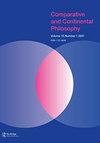In This Issue 13.02
IF 0.3
0 PHILOSOPHY
引用次数: 0
Abstract
We follow up our special issue on Argentinian philosophy with a selection of essays that continue to expand and pluralize our sense of the philosophical enterprise. In “Aesthetic Negation and Citation: Levinas, Agnon, and the Paradox of Literature,” Lawrence Harvey complicates our expectation that Levinas had an ethical aversion to literature. Not only is Totality and Infinity, for example, bracketed with literary allusions, his mature work makes frequent and appreciative use of it. The author turns to S. Y. Agnon (1888–1970) to offer a complementary model of the ethical force of the kind of literature that “‘de-nucleates’ the totalizing solidity of the underlying Platonic forms.” In “Is Anti-Oedipus Really a Critique of Psychoanalysis?” Axel Chemiavsky explores the foundations of critique in Deleuze and Guattari’s Anti-Oedipus and suggests that the authors combine a Kantian delimitation of the synthesis of the unconsciousness and Nietzsche’s conception of life. Chemiavsky proceeds by first looking at how Anti-Oedipus tries to distinguish between the illegitimate and legitimate uses of synthesis, turning to the question of the object for critique. Psychoanalysis as a conception of life, as Deleuze and Guattari formulate it, is a particular “configuration of desire” where desire itself is multiple. Leo Kwok looks at the problem of what makes understanding philosophical traditions across cultures possible or impossible. The dilemma that either one “assimilates” one tradition into the other or declares an “incommunicability” thesis assumes that intercultural understanding is identical to intercultural philosophy. To solve this dilemma Kwok proposes an approach of intercultural dialogue which begins with questioning, supplemented by what he calls the “TQX model.” This technique (if one may call it so) is demonstrated through looking at ideas from the Mencius and Levinas. He concludes by giving an example of intercultural dialogue with an investigation into the concept of dao as “origin” and Derrida’s articulations of “genesis.” Jiani Fan pushes against the general conception that Nietzsche is an heir to the Ancient Skeptics, contending that Nietzsche’s position is much more ambivalent, his inheritance not without critique. Through an exploration of Nietzsche’s rhetoric, Fan examines the peculiarity of his literary style that, while indebted to the Pyrrhonians, nevertheless reveals an “assertive” yet “non-committal” perspective. This tension reveals a particular uncertainty in value judgments that do not allow for interrogation into presuppositions and criteria. Joshua Stoll in “Being to Being: Sartre, Ramchandra Gandhi, and Abhinavagupta on Intersubjectivity” critically intervenes into Sartre’s notorious assumption that “hell is other people” as we become trapped in the gaze (le regard) of others. Turning to the advaita or non-dual thought of the contemporary Indian philosopher Ramchandra Gandhi as well as the medieval Kashmiri thinker Abhinavagupta, the author provides a contrary reading in which the primary relationship becomes subjectifying and liberating. Our issue includes review essays of two important new works. Glen A. Mazis discusses Adam Loughnane’s Merleau-Ponty and Nishida: Artists Expressing Faith Intrinsic to Embodiment and Mike Grimshaw reflects on Saitya Das’s provocative new work on Kierkegaard’s political theology. It concludes with Yan Yan’s book review of Galen A. Johnson, Mauro Carbone, and Emmanuel de Saint Aubert’s Merleau-Ponty’s Poetic of the World: Philosophy文档版本13.02
继我们关于阿根廷哲学的特刊之后,我们精选了一些文章,这些文章继续扩展和丰富我们对哲学事业的理解。劳伦斯·哈维在《美学否定与引文:莱文、阿农与文学悖论》一书中,使我们对莱文对文学有伦理厌恶的期望变得复杂。例如,“总体性”和“无限性”不仅被文学典故所包围,他的成熟作品也经常对其进行欣赏性的使用。作者求助于S.Y.Agnon(1888-1970),为这种文学的伦理力量提供了一个补充模型,“去核化”了潜在柏拉图形式的整体性。阿克塞尔·切米亚夫斯基在《反俄狄浦斯真的是精神分析批判吗。Chemiavsky首先着眼于反俄狄浦斯如何试图区分合成的非法和合法用途,并转向批判对象的问题。精神分析作为一种生活概念,正如德勒兹和瓜塔里所表述的那样,是一种特殊的“欲望配置”,欲望本身是多重的。Leo Kwok关注的问题是,是什么让理解不同文化的哲学传统成为可能或不可能。要么将一种传统“同化”为另一种传统,要么宣布“不可沟通”的困境假设跨文化理解与跨文化哲学是相同的。为了解决这一困境,郭提出了一种跨文化对话的方法,这种方法从提问开始,辅以他所说的“TQX模式”。这种方法(如果可以这么说的话)是通过观察孟子和列文的思想来证明的。最后,范以跨文化对话为例,考察了道作为“起源”的概念和德里达对“起源”问题的阐述。他反对尼采是古代怀疑论者继承人的普遍观点,认为尼采的立场更加矛盾,他的继承并非没有批判。通过对尼采修辞学的探索,范审视了他的文学风格的独特性,这种风格虽然归功于皮尔逊学派,但却揭示了一种“自信”但“不确定”的视角。这种张力揭示了价值判断中的一种特殊的不确定性,这种不确定性不允许对预设和标准进行审问。Joshua Stoll在《存在:萨特、拉姆昌德拉·甘地和阿比那瓦古普塔论主体间性》中批判性地介入了萨特臭名昭著的假设,即当我们陷入他人的凝视(尊重)时,“地狱就是他人”。转向当代印度哲学家拉姆昌德拉·甘地和中世纪克什米尔思想家阿比那瓦古普塔的advaita或非双重思想,作者提供了一种相反的解读,在这种解读中,主要关系变得服从和解放。本期包括两部重要新作的评论文章。Glen A.Mazis讨论了Adam Loughnane的《Merleau Ponti and Nishida:Artists Expressing Faith Intraneous to Implementation》,Mike Grimshaw反思了Saitya Das关于克尔凯郭尔政治神学的挑衅性新作。最后以严对约翰逊、卡博尼和圣奥伯特的《世界诗学:哲学》的书评作为结语
本文章由计算机程序翻译,如有差异,请以英文原文为准。
求助全文
约1分钟内获得全文
求助全文

 求助内容:
求助内容: 应助结果提醒方式:
应助结果提醒方式:


